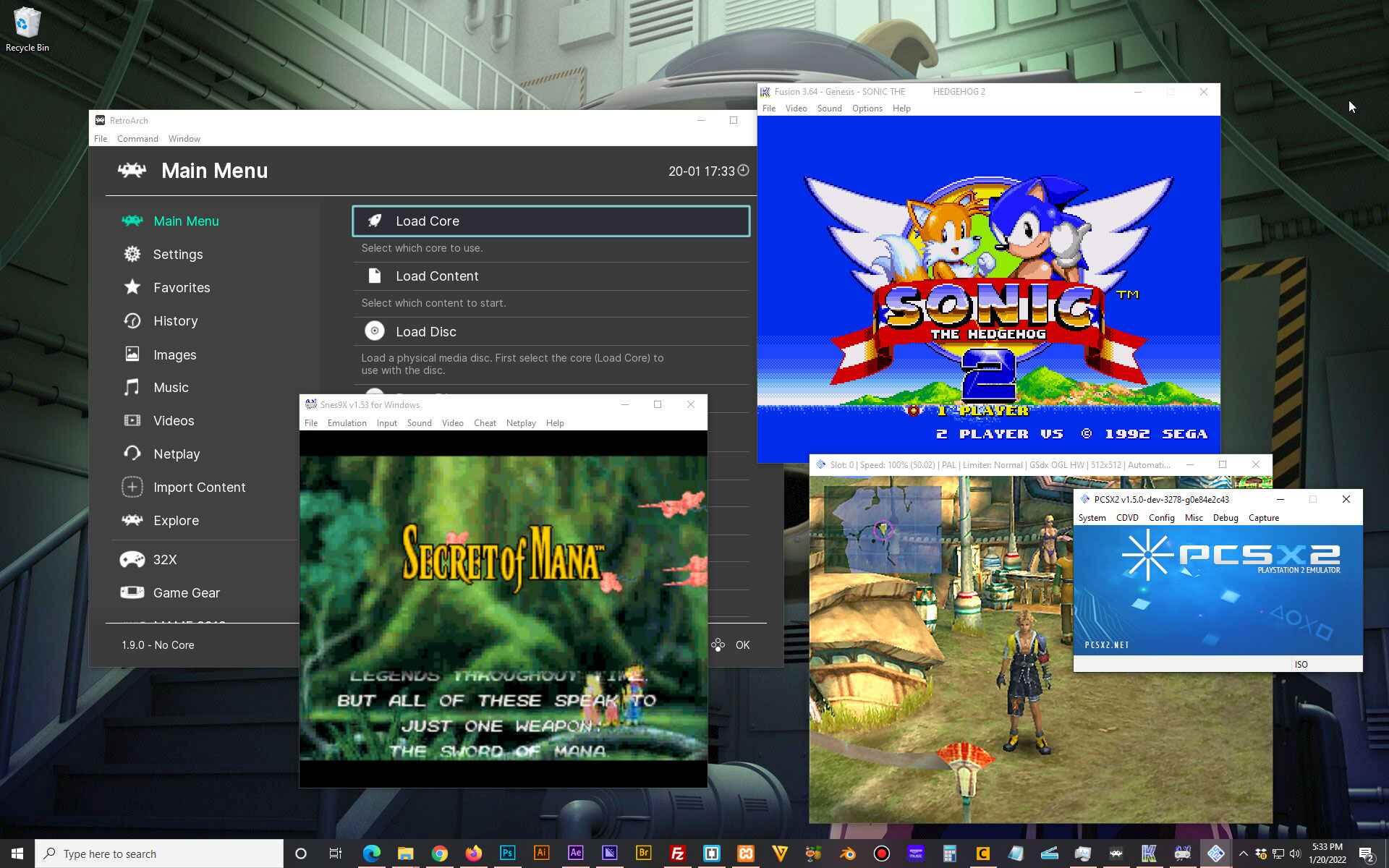Introduction
Welcome to the world of gaming nostalgia! As avid gamers, we often find ourselves drawn to the charm and allure of retro games. The ability to relive our favorite childhood classics and experience the golden age of gaming is truly magical. And one of the best ways to enjoy these retro games is by downloading ROMs.
ROMs, short for Read-Only Memory, are digital copies of game cartridges or discs that can be played on emulators. These emulators mimic the functionality of older gaming consoles, allowing you to play retro games on your computer, smartphone, or other devices. Whether you want to dive back into the pixelated world of Super Mario Bros, embark on epic quests in The Legend of Zelda, or engage in intense battles in Pokémon, ROMs open up a treasure trove of gaming experiences.
However, it is important to note that downloading ROMs, especially copyrighted ones, is a legal grey area. While it is generally acceptable to download ROMs of games that you already own a physical copy of, distributing or downloading ROMs of games you don’t legally own is considered piracy and is against the law. It’s always a good idea to be aware of the laws and regulations surrounding ROMs in your country or region.
In this comprehensive guide, we’ll walk you through the process of downloading ROMs legally and responsibly, ensuring that you can enjoy the retro gaming experience without infringing on any copyright laws. We’ll provide tips on finding reliable ROM websites and selecting the right emulator for your needs. We’ll also offer troubleshooting advice to help you overcome any common issues you may encounter along the way.
So, if you’re ready to embark on a journey down memory lane and discover the joys of retro gaming, let’s get started on this exciting rom-adventure!
Understanding ROMs
Before we dive into the process of downloading ROMs, it’s important to have a clear understanding of what ROMs actually are. As mentioned earlier, ROM stands for Read-Only Memory. In the context of retro gaming, ROMs refer to digital copies of the game data that was originally stored on physical cartridges or discs.
When gaming consoles were popular in the past, cartridges or discs contained a combination of data chips that held the game’s code, graphics, and audio files. These cartridges or discs were inserted into the consoles, allowing players to access and play the games. However, with the advancement of technology, the need for physical media has diminished, and we now have the ability to play these games digitally through ROMs and emulators.
ROMs come in different file formats, depending on the console they were originally designed for. Some common ROM file formats include .nes (for Nintendo Entertainment System), .snes (for Super Nintendo Entertainment System), .gba (for Game Boy Advance), and .iso (for PlayStation).
Emulators are the software programs that enable us to play these ROMs on modern devices. Emulators mimic the functionality of the original gaming consoles, allowing you to enjoy the games on your computer, smartphone, or other devices. These emulators replicate the system architecture, graphics, sound, and other features of the original consoles.
It’s important to note that the legality of using emulators can vary depending on the country or region you live in. While most emulators are legal, downloading and using emulators for the purpose of playing copyrighted ROMs without owning the original game is generally considered illegal. Always research the laws and regulations surrounding emulators and ROMs in your area to ensure you are using them responsibly and legally.
Understanding ROMs and how they work with emulators is crucial to both enjoying retro gaming and staying within the bounds of the law. In the next sections, we’ll explore how to find reliable ROM websites, choose the right emulator for your needs, and safely download and install ROMs onto your device.
Legal Considerations
When it comes to downloading and using ROMs, it’s important to understand the legal considerations involved. While the availability of ROMs and game emulators has made it easier than ever to enjoy retro games, it’s essential to stay within the boundaries of copyright laws and regulations.
The legality of ROMs can vary from country to country, and it’s important to be familiar with the laws that apply to your specific region. In some cases, it may be legal to download and use ROMs if you own a physical copy of the game. This concept is known as “abandonware,” where a game is no longer commercially available or supported by the original publisher or developer.
However, in most cases, downloading ROMs without owning the original game is considered piracy and is against the law. Game developers and publishers protect their intellectual property rights, and distributing or using copyrighted content without permission is a violation of those rights.
It’s essential to understand that while many ROM websites claim to offer “legal” downloads, this may not always be the case. Some websites exploit loopholes or operate in jurisdictions with more relaxed copyright laws, but accessing ROMs from such sources can still be risky and potentially illegal in your country.
To ensure you are acting within the bounds of the law, it’s best to take the following precautions:
- Backup Your Physical Games: If you own physical copies of games, it’s a good practice to create backup copies for personal use. This ensures that you have a legitimate copy of the game to accompany any downloaded ROMs and can provide evidence of ownership if required.
- Research the Copyright Status: Before downloading any ROMs, research the copyright status of the game you wish to play. If the game is still commercially available or actively supported by the developer, it’s best to avoid downloading ROMs, as it is likely a violation of copyright laws.
- Use Trusted Sources: When searching for ROMs, rely on reputable websites that have a track record for legality and safety. These websites often have guidelines and policies in place to ensure compliance with copyright laws and protect users from malicious downloads.
- Donate to Developers: If you enjoy using emulators and ROMs, consider supporting the original developers by purchasing officially released collections or remastered versions of the games. This helps to support the gaming industry and ensures your continued enjoyment of retro games within the boundaries of the law.
By following these legal considerations, you can enjoy retro gaming while respecting the rights of game developers and publishers. Remember that the laws surrounding ROMs can be complex, so it’s always a good idea to seek legal advice or consult local copyright laws to ensure you remain compliant.
Finding Reliable ROM Websites
When it comes to downloading ROMs, one of the most critical aspects is finding reliable websites that offer safe and legitimate downloads. With the abundance of ROM websites available online, it can be challenging to determine which ones are trustworthy, secure, and provide high-quality ROMs. Here are some key considerations when searching for reliable ROM websites:
- Reputation and Reviews: Look for well-established ROM websites that have positive reviews and a solid reputation among the gaming community. Check online forums, gaming communities, and social media platforms for recommendations and feedback from other users.
- Quality and Variety: A reputable ROM website will offer a wide selection of ROMs for various gaming consoles. They should also prioritize quality, providing ROMs that are free from glitches, viruses, or malware. Look for websites that have user ratings or reviews for each ROM, indicating the community’s feedback on the file’s authenticity and performance.
- Legality: It’s crucial to choose ROM websites that operate within the bounds of the law. Avoid websites that openly promote piracy or offer copyrighted games without proper licensing or permissions. Legitimate ROM websites often include disclaimers or guidelines to ensure compliance with copyright laws.
- User Interface and Experience: A user-friendly website design, intuitive navigation, and clear instructions for downloading ROMs are essential factors to consider. A well-designed ROM website makes it easier to find the desired ROMs and enhances the overall user experience.
- Safe and Secure Downloads: Security should be a top priority when downloading ROMs. Ensure that the ROM website provides secure connections (HTTPS) and has measures in place to protect users from malware or malicious files. It’s also advisable to have reliable antivirus software installed on your device.
- Community and Support: Look for ROM websites that have an active and supportive community. Websites with forums, FAQs, or dedicated support channels can provide assistance in case you encounter any issues or need guidance during the downloading or installation process.
Remember, it’s always advisable to thoroughly research and evaluate ROM websites before downloading from them. Taking the time to find reliable sources ensures that you are getting high-quality ROMs that are safe to use and free from copyright infringement. Additionally, staying within the bounds of legality contributes to preserving the retro gaming community and supporting the rights of game developers.
Now that you are equipped with the knowledge of finding reliable ROM websites, let’s move on to the next section and explore the process of choosing the right emulator for your gaming needs.
Choosing the Right Emulator
Once you have obtained your desired ROMs from a reliable source, the next step is to choose the right emulator to play them. Emulators are software programs that replicate the functions of older gaming consoles, allowing you to play ROMs on modern devices. Here are some key factors to consider when selecting the right emulator for your needs:
- Platform Compatibility: Emulators are available for various platforms, including Windows, Mac, Linux, Android, iOS, and more. Consider the device you will be using for gaming and choose an emulator that is specifically designed for that platform.
- Console Compatibility: Different emulators specialize in replicating specific gaming consoles, such as NES, SNES, Sega Genesis, Game Boy, PlayStation, and many more. Ensure that the emulator you choose is compatible with the specific gaming console of the ROMs you wish to play.
- User Interface: Emulators come with different user interfaces, ranging from simple and minimalistic to feature-rich and customizable designs. Some emulators offer additional features, such as save states, cheat code support, and controller customization. Consider your preferences and choose an emulator with a user-friendly interface that suits your gaming style.
- Performance: Emulators vary in terms of performance and compatibility with different ROMs. It’s important to choose an emulator that can run smoothly on your device, providing an optimal gaming experience without lag or graphical glitches. Look for emulator reviews, user feedback, and system requirements to ensure compatibility and performance.
- Additional Features: Some emulators offer additional features, such as multiplayer support, online connectivity, and the ability to enhance graphics or apply filters to improve the visual quality of the games. If these features are important to you, consider emulators that provide such options.
- Developer Support and Updates: A well-maintained emulator with active developer support is more likely to receive regular updates, bug fixes, and improvements. Consider emulators that have an active development community, as it ensures a better overall gaming experience and compatibility with future ROM releases.
Exploring and experimenting with different emulators is part of the fun and adventure of retro gaming. You may find that different emulators work better for different games, so don’t hesitate to try out a few options to see which one suits your needs best.
Remember, the legality of emulators can vary in different regions, so always ensure that you are using emulators responsibly and within the bounds of the law. By selecting the right emulator, you can fully immerse yourself in the world of retro gaming and enjoy your favorite classic games to the fullest.
Now that you have the perfect emulator in hand, let’s move on to the next section and explore the process of downloading and installing ROMs onto your device.
Downloading and Installing ROMs
Now that you have chosen the right emulator for your gaming needs, it’s time to download and install ROMs onto your device. Here is a step-by-step guide to help you through the process:
- Find a Trusted Source: Begin by finding a reliable ROM website that offers the specific ROMs you want to download. Refer to the previous section on finding reliable ROM websites for guidance.
- Select the ROM: Browse through the website’s library and locate the ROM you wish to download. Pay attention to the file format and ensure that it is compatible with your chosen emulator.
- Download the ROM: Click on the download link provided for the ROM file. Some websites may require you to create an account or complete a verification process before allowing the download to begin. Follow the website’s instructions and ensure that you are downloading from a secure source.
- Save the ROM File: Choose a destination folder on your device where you want to store the downloaded ROM file. Make sure to save it in a location that you can easily access later.
- Extract or Unzip the ROM (if necessary): Sometimes, ROM files may be compressed in a ZIP or RAR format. If this is the case, use a file extraction tool, such as WinRAR or 7-Zip, to extract the ROM file from the archive.
- Open Your Emulator: Launch your chosen emulator on your device. Most emulators have a straightforward installation process and should be ready to use once installed.
- Load the ROM: In the emulator’s user interface, look for an option to load or open a ROM file. Navigate to the folder where you saved the downloaded ROM file and select it.
- Start Playing: Once you have loaded the ROM, the emulator should start running the game. Enjoy your retro gaming experience and relish in the nostalgia of your favorite classic games!
It’s important to note that downloading and using copyrighted ROMs without owning the original game is against the law in many regions. Be sure to download ROMs only for games that you own physically or that are legally available for free by the developer or copyright holder.
In cases where you own the original game, creating a backup copy of the ROM is generally considered acceptable for personal use. Remember to always comply with the copyright laws in your country or region and use ROMs responsibly.
Should you encounter any issues during the downloading or installation process, consult the emulator’s documentation or refer to the community support provided by the emulator’s developers or forums dedicated to retro gaming enthusiasts.
Now that you have successfully downloaded and installed your ROMs, it’s time to enjoy the wonderful world of retro gaming! However, before we conclude, let’s address some common troubleshooting issues that you may encounter along the way.
Troubleshooting Common Issues
While retro gaming with ROMs and emulators is generally a smooth experience, there may be times when you encounter some common issues. Here are some troubleshooting tips to help you overcome these challenges:
- Compatibility Issues: Ensure that the ROM you downloaded is compatible with your chosen emulator. Some ROMs may require specific settings or plugins to work correctly.
- Performance Problems: If you experience lag or slow performance, try adjusting the emulator’s settings. Decreasing the graphics resolution, disabling certain features, or allocating more resources to the emulator may help improve performance.
- Controller Configuration: If you’re using a controller, make sure it is properly connected and configured. Most emulators allow you to map the controls manually to match the original console’s layout.
- Save States: Save states allow you to save your progress in a game and load it later. If save states aren’t working, check that you have the correct settings enabled in the emulator and that you have sufficient disk space available.
- Audio or Visual Glitches: If you encounter sound or visual issues, try adjusting the emulator’s audio and graphics settings. Switching between different rendering options or enabling specific audio plugins can often resolve these problems.
- ROM Not Loading: If a ROM fails to load in the emulator, double-check that it is in the correct file format and placed in the proper directory. Some emulators may require ROMs to be placed in specific folders for proper detection.
- Corrupted or Incomplete ROM: If a ROM fails to launch or crashes during gameplay, it may be corrupted or incomplete. Try redownloading the ROM from a trusted source and ensure that your internet connection is stable during the download process.
- Antivirus Blocking Emulator or ROM: Occasionally, antivirus software may flag emulators or ROMs as potentially harmful. Whitelist the emulator and ROM files in your antivirus software or temporarily disable it while running the emulator.
If you encounter persistent issues or errors that you can’t resolve on your own, don’t hesitate to reach out to the emulator’s support community or forums. These online communities are often filled with helpful individuals who have experience troubleshooting various emulator-related issues.
Remember to regularly update both your emulator software and ROMs to ensure compatibility, security, and improved performance.
With these troubleshooting tips in mind, you should be well-equipped to handle any common issues that may arise during your retro gaming adventures.
Now that you’re familiar with troubleshooting, it’s time to wrap up this guide. We hope that you’ve found it informative and helpful in your quest to download, install, and play ROMs responsibly. Now, go ahead and enjoy your favorite classic games, reliving the nostalgia and experiencing the magic of retro gaming!
Conclusion
As we wrap up this comprehensive guide on downloading ROMs and playing retro games, we hope that you now have a clear understanding of the process, legal considerations, and necessary precautions. Retro gaming with ROMs and emulators allows us to relive the nostalgia of our favorite classic games. However, it’s crucial to remember the importance of respecting copyright laws and supporting the gaming industry.
By finding reliable ROM websites, choosing the right emulator, and downloading ROMs legally and responsibly, you can enjoy the enchanting world of retro gaming while staying within the boundaries of the law. Remember to research the copyright status of games, backup your physical copies, and support the developers whenever possible.
In addition, troubleshooting common issues that may arise during the process of downloading, installing, and playing ROMs ensures a smoother and more enjoyable gaming experience. Communities and forums dedicated to retro gaming can be valuable resources for finding solutions to any challenges you may encounter.
Always prioritize the security and safety of your devices by using trusted sources for downloads and having reliable antivirus software installed. Regularly update your emulators and ROMs to enhance compatibility, performance, and security.
With these guidelines in mind, you are now ready to embark on your own retro gaming adventure. Revisit those cherished childhood memories, discover hidden gaming gems, and explore the rich history of the gaming industry.
Happy gaming!

























